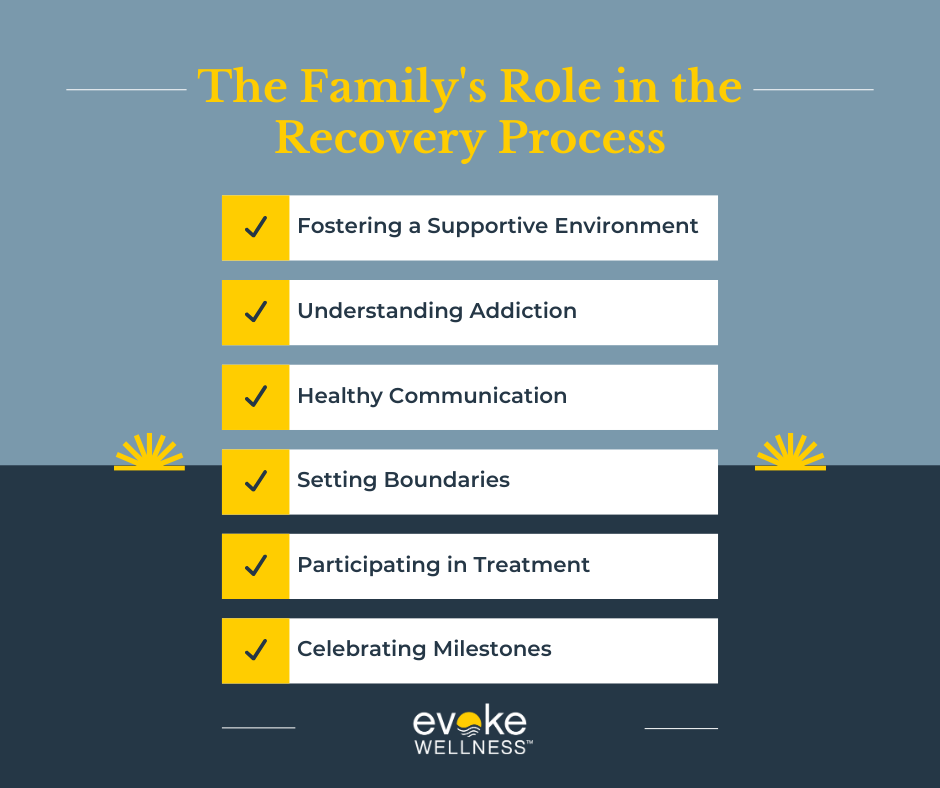As you navigate the challenging journey of addiction recovery, you may wonder about the most effective treatment approaches. Family therapy has emerged as a crucial component in comprehensive addiction treatment programs. Recent studies show that involving family members in the recovery process can significantly improve outcomes. A 2022 review in the Journal of Substance Abuse Treatment found that family-based interventions reduced substance use by 30-60% compared to individual therapy alone. This article explores how family therapy integrates with addiction treatment, mental health care, dual diagnosis treatment, and specialized programs for veterans. Discover how rebuilding family dynamics can provide a strong foundation for lasting recovery and healing.
Together, let’s embrace the journey to recovery and the promise of a new beginning. Call us at (866)429-2960 today or reach out online.
The Importance of Family Support in Addiction Recovery
A Vital Role in Rehabilitation
Family members play an indispensable role in supporting a loved one through the challenging journey of addiction recovery. Their involvement can significantly improve treatment outcomes and increase the chances of lasting sobriety. Beyond emotional encouragement, families provide practical assistance by helping access resources, manage finances, and navigate daily responsibilities.
Addressing Mental Health Issues
Addiction often co-occurs with mental health disorders, necessitating a comprehensive approach. Family therapy equips everyone with tools to improve communication, resolve conflicts, and strengthen relationships damaged by substance abuse. This collaborative effort addresses underlying issues that may have contributed to the addiction’s development.
Preventing Relapse
One of the most critical roles families play is in relapse prevention. They can identify triggers, provide accountability, and create a safe, supportive environment conducive to sustained recovery. Even after treatment, ongoing family support through alumni programs or counseling reinforces the individual’s commitment to sobriety.
Rebuilding Trust and Connection
The recovery process often involves making amends for past harm caused by addiction. Family therapy facilitates open discussions, understanding the disease’s nature, and setting healthy boundaries. This paves the way for rebuilding trust, repairing relationships, and fostering reconnection within the family unit.
Fostering a Supportive Community
In addition to family involvement, peer support groups and 12-step programs offer substantial benefits. These forums provide a safe space for vulnerability, diverse perspectives from others’ journeys, and a sense of community that combats isolation. Maintaining this supportive network is crucial for long-term recovery success.
Family Dynamics and Addiction
The Intricate Web
Addiction casts a wide net, ensnaring not just the individual but their entire family system. The complex interplay between addiction and family dynamics can either facilitate recovery or perpetuate a vicious cycle. Dysfunctional patterns, such as codependency, enabling behaviors, and communication breakdowns, can inadvertently reinforce addictive tendencies.
Rebuilding Trust
Addiction strains even the most resilient relationships, eroding trust and emotional intimacy. Rebuilding these bonds is an integral part of the recovery journey. Strategies like establishing healthy communication patterns, improving empathy, setting boundaries, and fostering mutual support can gradually restore trust within the family unit.
The Healing Process
Family therapy plays a pivotal role in helping families navigate this healing process. By promoting understanding of addiction as a disease, improving coping mechanisms, and addressing underlying issues, family therapy equips loved ones with the tools to provide effective support. Celebrating milestones, no matter how small, reinforces positive change and encourages perseverance.
A Holistic Approach
Successful addiction recovery requires a holistic approach that addresses not just the physical aspects but also the psychological and social factors. Family involvement, coupled with comprehensive therapy, life skills training, and relapse prevention strategies, empowers individuals to rebuild meaningful connections and pursue lasting sobriety.
The Family’s Role in the Recovery Process
Fostering a Supportive Environment
Family involvement plays a pivotal role in the addiction recovery journey. A compassionate, non-judgmental environment fosters trust and open communication, allowing individuals to feel understood and motivated to maintain sobriety. Families can provide emotional encouragement, accountability, and a safe space free from triggers.
Understanding Addiction
Educating themselves about substance use disorders as a chronic disease is crucial for families. This understanding promotes patience, empathy, and realistic expectations during the recovery process, which often involves setbacks and relapses.
Healthy Communication
Consistent, honest dialogues within families help resolve disagreements and identify enabling behaviors that may hinder progress. Attending counseling sessions together can improve communication skills and heal damaged relationships.
Setting Boundaries
While offering care, families must also establish healthy boundaries and hold their loved ones accountable. This balance prevents codependency and reinforces personal responsibility in maintaining sobriety.
Participating in Treatment
Many rehabilitation centers encourage family involvement through support groups, counseling, and therapy sessions. This collaborative approach equips families with tools to create a nurturing environment conducive to lasting recovery.
Celebrating Milestones
Recognizing and celebrating progress, no matter how small, boosts self-esteem and reinforces positive changes. Families can provide encouragement and hope for a fulfilling, substance-free future.
With patience, education, and a commitment to healing, families can play an instrumental role in supporting their loved ones’ journeys towards sobriety and overall well-being.
Preventing Relapse Through Family Involvement
Family involvement is crucial in the recovery process, providing support and accountability that can significantly reduce the risk of relapse. According to Evoke Wellness, effective communication through joint counseling sessions helps establish open dialogue and foster understanding between loved ones.
Understanding Addiction’s Impact
Addiction impacts the entire family system, and educating loved ones about the disease is essential. Family members often experience emotional turmoil, financial strain, and strained relationships due to their loved one’s substance abuse. Comprehensive treatment programs involve the family to promote healing and prevent future relapse.
Strengthening Support Systems
Family therapy equips loved ones with tools to create a healthy, sober environment for their recovering family member. Setting boundaries, practicing self-care, and joining support groups empower families to provide emotional support without enabling destructive behaviors.
Holistic Approach to Recovery
Lasting recovery extends beyond abstinence, requiring the development of coping mechanisms, rebuilding relationships, and fostering a positive self-image. Family involvement reinforces the use of healthy life skills learned during treatment and aids in the transition to aftercare and sober living.
Dual Diagnosis and Relapse Prevention
Treating co-occurring mental health issues is crucial for maintaining long-term sobriety. Family members can play a vital role in this process by providing a supportive environment, recognizing triggers, and seeking prompt professional help during times of stress or potential relapse.
By actively involving the family in the recovery journey, individuals are better equipped to maintain sobriety and prevent relapse. Evoke Wellness’ Family Program engages loved ones, empowering them to be an integral part of the healing process.
Tailoring Family Therapy for Specific Populations
Addressing Veterans’ Unique Needs
Family therapy plays a pivotal role in addressing the specific challenges faced by veterans struggling with addiction. The unique experiences of military service, including exposure to trauma, separation from loved ones, and the difficulties of reintegration, can profoundly impact both veterans and their families. According to a study by the Substance Abuse and Mental Health Services Administration (SAMHSA), nearly 1 in 15 veterans had a substance use disorder in 2020.
Specialized family therapy approaches for veterans aim to rebuild trust, improve communication, and foster a supportive environment for recovery. These programs address issues such as post-traumatic stress disorder (PTSD), traumatic brain injury, and the unique challenges of military culture.
Integrating Family Therapy in Dual Diagnosis Treatment
Individuals with co-occurring substance use and mental health disorders, known as dual diagnosis, often benefit from family therapy as part of an integrated treatment approach. According to the National Institute on Drug Abuse (NIDA), over 50% of those with a substance use disorder also have a co-occurring mental health condition.
Family therapy can help educate loved ones about the complexities of dual diagnosis, foster understanding and support, and address the impact of these conditions on family dynamics. By involving family members in the treatment process, individuals can develop a stronger support system and improve their chances of long-term recovery.
Culturally Responsive Family Therapy
Effective family therapy approaches must be adapted to meet the unique needs of diverse cultural and ethnic groups. According to a study published in the Journal of Marital and Family Therapy, culturally responsive family therapy can improve treatment engagement, retention, and outcomes for minority populations.
Therapists must be attuned to cultural values, beliefs, and traditions that may influence family dynamics, communication styles, and attitudes towards addiction and mental health. By incorporating cultural humility and sensitivity, family therapy can create a safe and inclusive environment for open dialogue, promoting understanding and healing.
Through tailored approaches that address the specific needs of veterans, individuals with dual diagnosis, and diverse cultural groups, family therapy can play a vital role in supporting successful addiction recovery and strengthening family systems.
Conclusion
In conclusion, family therapy plays a crucial role in addiction recovery, offering benefits that extend far beyond the individual struggling with substance abuse. By addressing family dynamics, improving communication, and fostering a supportive environment, this approach significantly enhances the chances of long-term sobriety. Recent studies show that family involvement in treatment can increase retention rates by up to 40% and reduce relapse rates by 30%. Whether you’re seeking addiction treatment, mental health support, dual diagnosis care, or specialized veterans’ services, incorporating family therapy into your recovery plan can provide the comprehensive support needed for lasting change. Remember, healing is a journey that involves not just the individual, but the entire family unit.
Begin Your Journey with Evoke Wellness
If you or a loved one is considering treatment, Evoke Wellness invites you to contact us. Our compassionate team is ready to answer your questions, discuss your needs, and help you take the first steps toward recovery. At Evoke Wellness, you will find more than just a treatment program – you’ll discover a community dedicated to your wellness and success. Together, let’s embrace the journey to recovery and the promise of a new beginning. Call us at (866)429-2960 today or reach out online.



